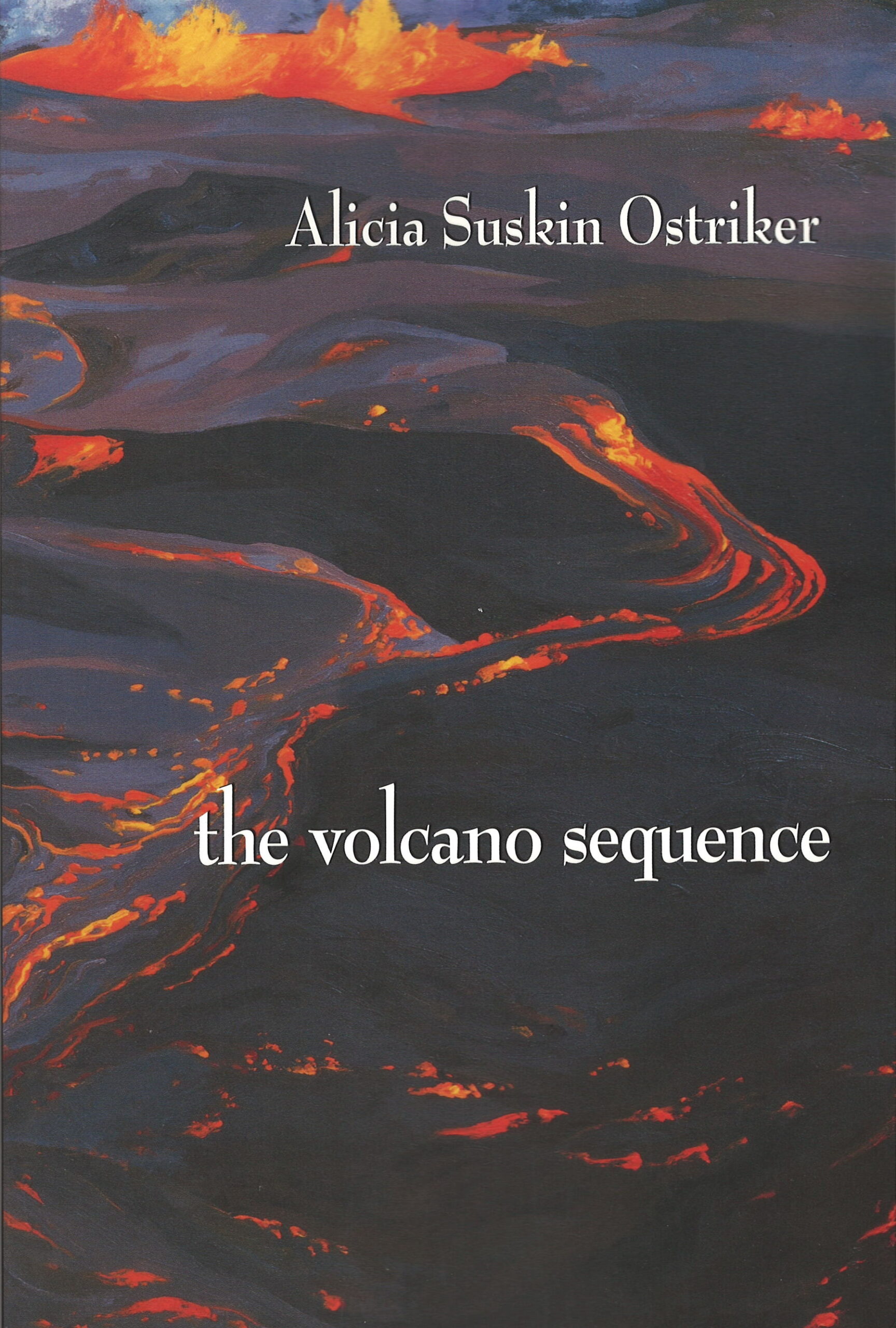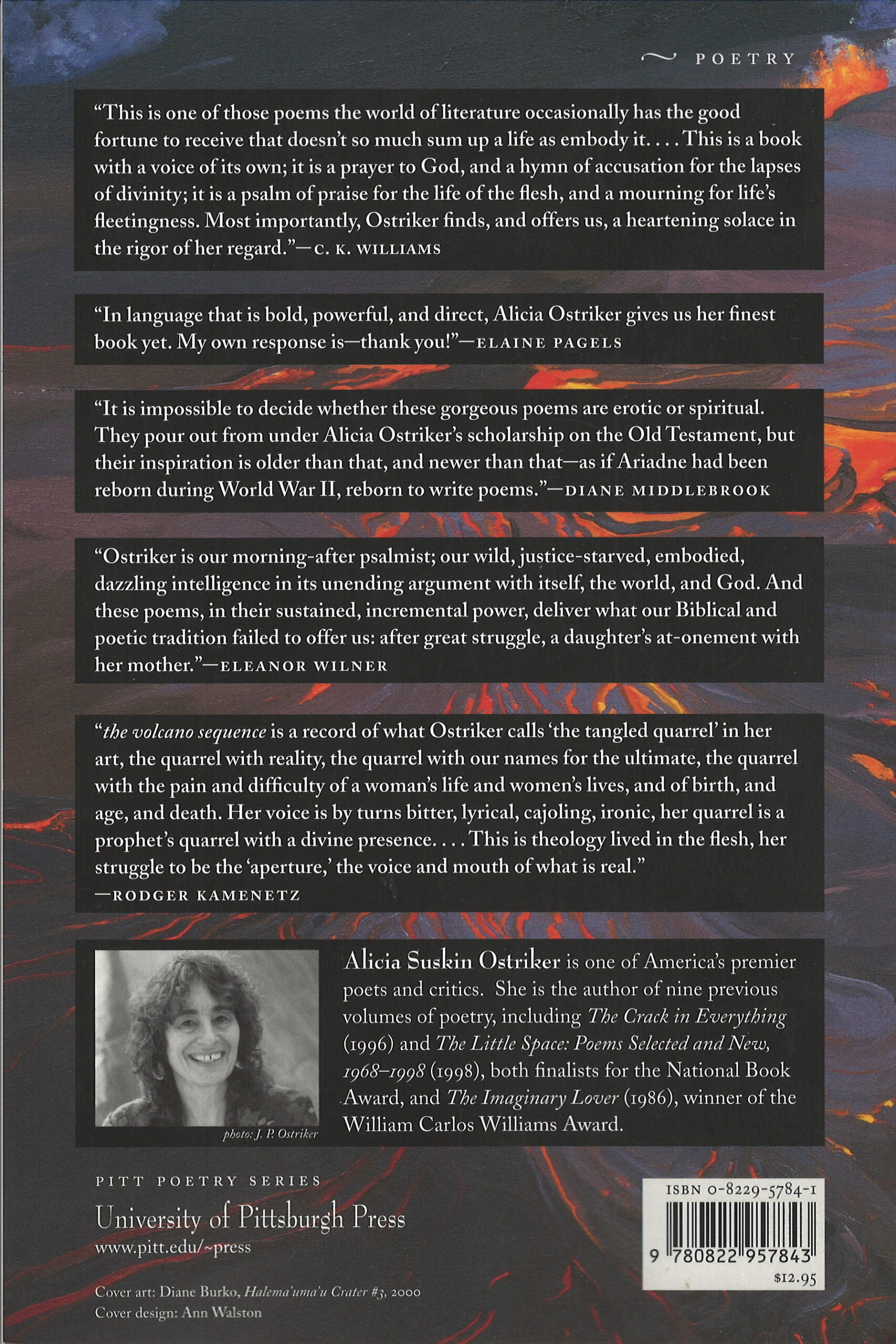 © 2022 Don Yorty. All rights reserved.
© 2022 Don Yorty. All rights reserved.
A friend of mine, the Philadelphia poet Joel Colten, on a trip across the USA, stopped to take photographs of Mount Saint Helens, and died when that volcano erupted in 1980. At Joel’s funeral—his body wouldn’t be found for over a year after his death—I remember the rabbi said, “You cannot look on the face of God and live.” I thought about Joel while reading the volcano sequence by Alicia Ostriker, poems that are about as close as one can get to the lava without falling in.
During a period of writer’s block, Alicia Ostriker found herself angry a lot, mostly at God and her mother. As her mother became increasingly frail, an inner voice began to speak to her, and although she didn’t like what she was hearing, she began to write down these irate impatient poems that were about to explode.
In the Vimeo below, Alicia Ostriker reads a variety of poems from volcano sequence that is divided into nine sections over the span of a year, from 1998 to 1999. Here is “volcano,” the first poem in the book and the first the poet reads. Enjoy.
volcano
Let me speak it to you in a whisper
I am like a volcano
that has blown itself
out of the water
my long stony curve
my melancholiac cliffs
a strip of old hard
exoskeleton
the blue Aegean flows
in and out of me
the tourists come, oh they come
to stand where the lava flew
to imagine how
the earth roared showed teeth
bucked and heaved
to look for an hour
at where the tidal wave began
that destroyed Atlantis
and created a myth
a green good world
you remember
…
A woman looked at my poem. What is a volcano? She wanted to
know. What makes you like a volcano. What would the world be like
without the myth of Atlantis?
the volcano is a crack in the earth
the volcano is a bulge over a crack
a fault line runs under it
something terrible happens
and the magma
coughs out
hot beauty
thick and magnificent rage
so what if afterward
everything dies
…
when I was a child
I was an island
a small round bushy island
inside me were many
roots, rocks, ores,
flowings and crevasses wrinkle
pushing like joy, like fear’s thin
fluids, like love’s neediness
maybe too much
and somehow they all turned
to anger and for years
the lava poured and poured
righteously
destroying all
in its path
righteously
roaring
…
the myth of Atlantis lets us believe
the world used to be better
people lived in harmony and grace once
fish came asking to be caught
the moon shimmered like a mist
in the hair of women
and because we believe this
we have to blame someone we have to
step down these slimy stairs
…
finally the lava stopped boiling
it cooled and hardened into what you see
blisters and carbuncles of cinders
rough and dry as the moon
striking terror, mindless
as an army, now it’s quiet
except for a fringe of surf
and the sway of water in the crater
…
what is Atlantis
what is the myth of innocence
before and after the kick of time
oh amniotic worm
poor lentil wearing your archaic smile
soft baby rockabye
soon you’ll be naked
rock cutting your tender feet
mud and tears coursing down your cheeks
the smell of money like brine
flags and bombs bursting around you
greed like a spirochete eating in
but if there is no Atlantis
no managed dream
how can a person breathe in that nihil air
doomed either way, dear God
And here is one more poem I had the pleasure of typing out from the eighth section of the book, “the volcano and the covenant, the first section of a poem entitled, “interlude: avenue of the americas.” One can feel in this poem Ostriker’s passionate emotions around the city life of our time.
Above the tongues of taxi cabs, the horns and buyers
the teeth of buildings grin at each other, the institutions
of media medicine publishing fashion
know how to
bite through human flesh
like hinged aluminum traps chopping the necks
of beavers, or like logging rigs, those saws
that go through a hundred-year-old
in about three minutes
take out a thousand acres
of virgin oregon forest
annually because loggers need jobs
intellectuals need the special sections
of the New York Times stacked
on driveways
each rosy dawn, the Japanese need
these pines and spruces
finally get turned into
everybody needs what they can get
and more. Yesterday walking
between fifty-third and fifty-second
on the avenue of the americas at twilight on my way
to a good restaurant with good friends I passed
three beggars wrapped in plastic. Why not say
beggars?
Why invent novelty phrases like “the homeless”
as if our situation were modern and special
instead of ancient and normal,
the problem of greed and selfishness?
The beggars turned toward me
as if they believed for a second
something new was about to happen
but nothing was
so the eyes sank rapidly back
like crabs into sand, and sorrow
pressed into me like a hot iron
after which I hurried through the hurrying crowd
sky overhead primrose and lilac, skyscrapers
uncanny mirrors filled with cloud bouquets
to overtake my friends who had strolled ahead
chatting so as not to be embarrassed
by the sight of charity
the rotting odor of need

You can purchase the volcano sequence here:
Chicago Distribution Center
Office Hours: M–F 9 a.m. – 5 p.m. Central Time
toll free: 800-621-2736
email: custserv@press.uchicago.edu
University of Pittsburgh Press publishes the volcanos sequence You can check it out here:
You can check out all of Alicia Ostriker’s books published by University of Pittsburgh Press here:

 Alicia Ostriker
Alicia Ostriker
 Alicia Ostriker
Alicia Ostriker

